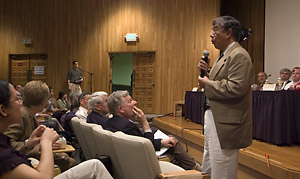Berkeleyan
Senate wrestles with industrial alliances
![]()
12 April 2007
On April 19, the Berkeley Division of the Academic Senate will hold a special meeting to discuss competing views related to the industry-sponsored research contract to establish the Energy Biosciences Institute.
The special meeting, from 1 to 3 p.m. in Booth Auditorium at Boalt Hall, will precede the regular spring division meeting, which is scheduled to run from 3 to 4 p.m. in the same location.
William Drummond, chair of the Berkeley Division, isn't making predictions about what will take place at the special meeting.
 William Drummond, chair of the Berkeley Division of the Academic Senate, addresses a March 8 senate meeting on the Energy Biosciences Institute. (Steve McConnell photo) |
Two resolutions seeking greater faculty oversight have been proposed. One is focused on the terms of the BP contract and the other has the stated goal of protecting "the integrity of the principle of shared governance." It seeks to develop "protocols to govern future contractual agreements between the university and all for-profit funding sources."
This has prompted at least one strongly worded counter-petition that is being circulated challenging these two resolutions as assaults on academic freedom. It calls upon the Academic Senate to take no action that "may infringe the right to freedom of inquiry by other faculty by seeking to deny them public or private research resources that fall within the existing rules and regulations."
The challenge, says Drummond, is to find a balance between "appropriate Senate review" and the university's ability to enter into research agreements with industry sponsors such as BP.
He points to ongoing steps taken by Vice Chancellor for Research Beth Burnside that began early last September as signs of the administration's good faith in seeking to strike that balance. Most recently, it has been agreed that four Academic Senate committee chairs will provide input on the draft contract language as negotiations proceed with BP.
Research contracts are not subject to Senate approval, but, Drummond says, one oversight in the usual process that has caused some faculty concern is that the administration did not make a request in writing to the campus Budget Committee to approve new faculty positions that would be included in the EBI.
"Nevertheless, this breach was mitigated by the fact that they had made many, many verbal presentations to [other Senate committees]," he adds. "So it wasn't as though this was a mystery. The controversy had more to do with the labyrinthine requirements of dealing with the Senate than it does with common sense."
In a letter posted on the division's website, Drummond ticked off a series of contacts between Berkeley administrators and Academic Senate representatives, which, he wrote, "demonstrates that the administration made a good faith effort to carry out appropriate Academic Senate review, from the outset of its contacts with BP."
Nonetheless, he says, "We need to come up with some sort of written rules going forward that would allow us to satisfy ourselves that we have oversight of these big projects, but not to become an obstacle in the way of seizing opportunities."
With the BP proposal, he said, faculty fears about shared governance were calmed when Burnside, on her own, offered to broaden Senate input by inviting the four committee chairs to represent the Senate and advise on the draft contract language.
He acknowledges that there remain pockets of opposition to the BP proposal. "But based on numerous e-mails and conversations I've had with faculty across the board - including conversations with people who actually signed the petition - had they known the administration was going this far to allow Senate participation in the contract, they never would have signed it," says Drummond.

